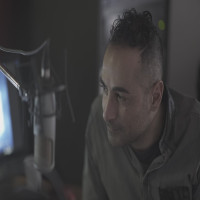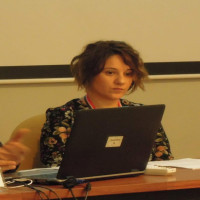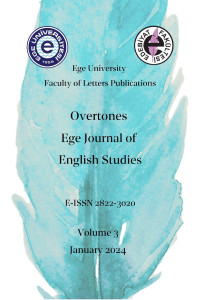Research Article
Book Review
Aim & Scope
Overtones Ege Journal of English Studies (E-ISSN 2822-3020) welcomes research articles and reviews related to all subjects in the field of English Language and Literature. The journal is an international, double-blind peer reviewed journal which offers open access to all.
The scope of the journal covers theoretical, critical and thematic contexts regarding English Studies, including English literature, linguistics, translation, cultural studies and all other related subjects.
Author Guidelines
Please find the CFP, Stylesheet, and Procedure here.
Authors are to submit complete, original and full-length articles (4000-8000 words) and reviews (1000-2000 words) which have not been published or under evaluation elsewhere. All articles will be scanned for plagiarism via Ithenticate. If any other instances of plagiarism are found during any of the stages of publication (reviewer evaluation, editorial reading and typesetting) the article will be rejected and the author will be notified immediately. Citation manipulated articles, or in other words, articles that are submitted to increase the citation number of a specific author will be rejected directly.
Please use the submission template uploaded on the journal website before sending the article for submission.
Ethical Principles and Publication Policy
Publication Ethics and Malpractice Statement
Overtones Ege Journal of English Studies aims to publish original double-blind evaluated research articles and reviews according to the highest standards of publication ethics. The journal uses Principles of Transparency and Best Practice in Scholarly Publishing published by the Committee on Publication Ethics (COPE), the Directory of Open Access Journals (DOAJ), and the Open Access Scholarly Publishers Association (OASPA).
For further information please visit https://publicationethics.org/
Copyright and Licensing
Overtones Ege Journal of English Studies uses Creative Commons License CC BY-NC 4.0 DEED (Attribution-NonCommercial 4.0 International) as an open-access journal. This license gives public permission to copy and use any material in the journal only if the original manuscript and the source are cited appropriately.
For further information please visit https://creativecommons.org/licenses/by-nc/4.0/deed.en
All authors accept the conditions of the license stated above.
Authors hold the responsibility of all copyright issues regarding their articles.
Authors hold all intellectual property rights regarding their articles without any exceptions on the condition that they give reference to the journal and they do not seek any financial profit.
There are no copyright fees paid to the authors published in the journal.
The views expressed in the journal are those of the authors, and do not necessarily coincide with those of the Editors or the Advisory Board. The PDF of the journal will be available to download for all. The names and e-mail addresses in the journal are to be used for academic purposes exclusively and will not be shared with any other party.
Article Submission & Evaluation Procedure
Articles and reviews should follow MLA parenthetical citation format and the journal’s paper submission template. All articles are assigned manuscript numbers within 48 hours of submission once they are approved by the editor who checks if the articles follow the journal’s guidelines. All articles are listed after the annual deadline (September 15) and sent to double blind evaluation within two weeks (October 1). The evaluation process of the reviewers is six weeks (November 15). Accepted articles are sent back to the authors for necessary corrections. The authors then have two weeks to work on their manuscripts according to reviewers’ suggestions (December 1) and submit their revised articles along with a short bio (max. 100 words) an abstract (max. 150 words) and 8 keywords. If one of the reviewers rejects the article, the author is advised to work on the article and send it once again to be evaluated for the next issue during the forthcoming year. Articles accepted by both reviewers are to be published in the current volume of the journal.
The chief editors are responsible for overseeing and supervising the editorial work.
The editor initially checks the manuscript to see if it meets the journal’s scope and standards. The role of the editor is to make decisions related to publication and accountability, along with ensuring the confidentiality of all parties including the editorial office, reviewers and authors. Furthermore, the editor works on improving journal quality by submitting the journal to international academic indexes. The editor and the editorial office are never to disclose any information regarding a submitted manuscript to anyone else but the corresponding author and potential reviewers. The reviewers’ and the authors’ personal information will remain anonymous throughout the evaluation process. The editor and the editorial office will monitor the publication ethics of the journal in each stage of publication and further read and evaluate the journal for plagiarism.
The advisory board includes international scholars from all fields of English Studies. The role of the reviewers is to ensure the quality of the journal by providing objective, scholarly, detailed and prompt evaluations of the submitted articles according to the “Reviewer’s Guide”. All manuscripts are to be evaluated in confidentiality and never shared with others during evaluation. The authors are responsible of providing original content without any plagiarism which meets the standards of international academic research. All sources used in the manuscripts should be cited properly. All those who have contributed to the manuscript should be listed as co-authors.
All authors are to state any conflicts of interest. It is the author’s responsibility to notify the editorial office if the author discovers any significant mistake in their published work in order to correct or retract the manuscript. In order to ensure blind evaluation, the authors should not include personal information in their manuscripts. The authors are to revise their manuscripts according to reviewers’ evaluations. The authors are to send the revised version of their manuscript to the editorial office by stating all the changes they have done.
The authors cannot submit the same article published in another language.
Plagiarism
All articles will be scanned for plagiarism via Ithenticate. If any other instances of plagiarism are found during any of the stages of publication (reviewer evaluation, editorial reading and typesetting) the article will be rejected and the author will be notified immediately. Citation manipulated articles, or in other words, articles that are submitted to increase the citation number of a specific author will be rejected directly.
Double Blind Peer Review
All articles are sent for double-blind peer evaluation to national and international scholars from all fields of English studies. Articles are sent to reviewers according to their specific fields of study. If one of the reviewers finds that the article does not hold up to the ethical standards of the journal, does not contribute to the field of study or the article is insufficient to the published, the article is sent back to the author in rejection. Reviewers' suggestions are sent to the author in due time to make necessary corrections before the article is ready to be published. Once necessary corrections are carried out, the article is enlisted to be published in the current volume of the journal.
The Accepted articles are sent back to the authors for necessary corrections. The authors then have two weeks to work on their manuscripts according to reviewers’ suggestions (December 1) and submit their revised articles along with a short bio (max. 100 words) an abstract (max. 150 words) and 6-8 keywords.
If one of the reviewers rejects the article, the author is advised to work on the article and send it once again to be evaluated for the next issue during the forthcoming year. Articles accepted by both reviewers are to be published in the current volume of the journal.
Research Ethics
The journal requires the highest standards regarding integrity, quality, and transparency during all stages of research and publication. All authors are to conduct independent research and disclose any conflict of interest where necessary. All authors are to state all involved parties regarding the research, including approval from institutions or organizations where necessary. The journal ensured the confidentiality of all authors and reviewers prior to and during publication.
Price Policy
The journal is completely free of charge.
Indexes
Journal Boards
Editorial Board


Advisory Board
Camila Oliveira Querino is research fellow at the University of Lisbon. She holds a PhD in English literature from the Federal University of Rio de Janeiro and King’s College London on the translation of Blake’s Jerusalem into Portuguese and biblical intertextuality. She is currently working on Romanticism and music reception and writing a monograph on William Blake and contemporary music.
I am a professor of American literature and American Studies.
Dr Charlotte Beyer is Senior Lecturer in English Studies at the University of Gloucestershire, UK. She is a prize-winning academic author and has published widely on crime fiction and contemporary literature. Dr Beyer is the author of three single-author scholarly monographs to date, Murder in a Few Words: Gender, Genre and Location in the Crime Short Story (McFarland, 2020), Contemporary Children's and Young Adult Literature: Writing Back to History and Oppression (Cambridge Scholars Publishing, 2021), and Intersectionality and Decolonisation in Contemporary British Crime Fiction (Cambridge Scholars Publishing, 2023). Her fourth monograph, Crime Fiction in the Age of #MeToo, was published by Anthem Press in November 2024. Her fifth monograph, currently in progress and under contract with McFarland, is on the subject of true crime.
Dr Beyer has edited six books to date. These include Contemporary Crime Fiction: Crossing Boundaries, Merging Genres (ed., Cambridge Scholars Publishing, 2021), and Teaching Crime Fiction (Palgrave, 2018). The latter book was shortlisted for the 2019 Teaching Literature Book Award. Her book Mothers Who Kill, co-edited with Josephine Savarese, was published by Demeter Press in February 2022. Decolonising the Literature Curriculum, her edited book on pedagogical scholarship, was published by Palgrave in March 2022, and was awarded the BACLS Edited Collection Prize.


English, Portuguese, French, Hungarian

Mette Rudvin completed her studies in Norway and the UK, and holds a PhD in Translation Studies. She taught English, translation and public service interpreting at the University of Bologna from 1996-2019, and is currently Associate Professor at the University of Palermo. She has taught a variety of subjects related to English language/literature, translation and dialogue interpreting, and has published widely nationally and internationally. In 2015 she set up the first multilingual continuous education course in interpreting in the legal sector at the University of Bologna; she works occasionally as a community- and legal interpreter and translator between Italian, English and Urdu. Her most recent publications include articles and books on interpreting in the workplace, legal and public-service interpreting in Italy, interpreting in the refugee setting, interpreting ethics, the interface between interpreting and philosophy, and English as a lingua franca. Her research/teaching interests also include oral narrative, Pakistan studies and more recently Food Writing.
Teresa Gibert currently works as a Professor Emerita in the Department of Foreign Languages (Departamento de Filologías Extranjeras), at the Spanish National Distance Education University (UNED). Prof. Gibert does research in English, American and Canadian Literatures.
Dr. Christoph Haase, M.A., Ph.D.
English Department
UJEP
__________________________________________________________
Academic qualification
M.A. 1998, summa cum laude, Ernst-Moritz-Arndt University Greifswald
Ph.D. 2003, summa cum laude, Chemnitz University of Technology
Teaching
Linguistics of the English language 1998 – 2020: at the universities Greifswald, Chemnitz, Bielefeld (all Germany)
2009 – current: UJEP, Czech Republic
numerous international guest teaching assignments within ERASMUS (Spain, Italy, Poland, Slovakia)
Research interests
Cognitive linguistics; language acquisition, especially SLA, Morphosyntax from a cognitive-functional perspective; causation and causativity; e-learning, language and computers/language and corpora; English for Academic Purposes (EAP), natural science English
Publications (list upon request)
ca. 90 international publications (research papers, monographs, edited volumes), two papers with 15 Web of Science citations, h=1; four papers with 21 SCOPUS citations, h=2
Reviews
board of reviewers for Discourse & Interaction (MUNI Press);
invited reviewer for Journal of English Linguistics (SAGE), International Journal of Corpus Linguistics (Benjamins), Corpus Pragmatics (Springer), Routledge (Semantics series), De Gruyter Open, Cognitive Science Society, AussigerBeiträge, Journal of Pragmatics(Elsevier), Brno Studies in English (MUNI Press), Ostrava Journal of English Philology, Ege Journal of English Studies, Journal of Social Epistemology (Routledge)
Conferences (list upon request)
ca. 100 international conferences (as speaker, organizer, panelist, keynote speaker, or attendee), most notably organizer of the CHALLENGES series of conferences at KAJ/UJEP

Prof. Dr. Mehmet Ali Çelikel graduated from Hacettepe University, Department of English Linguistics in 1993. He completed his MA in English Language and Literature at the University of Hertfordshire in England in 1997. He got his PhD with a thesis entitled “The Post-Colonial Condition: The Fiction of Rushdie, Kureishi and Roy” at Liverpool University in England in 2001. He has published two academic books in Turkish on post-colonial novel, entitled as Sömürgecilik Sonrası İngiliz Romanında Kültür ve Kimlik [Culture and Identity in Postcolonial English Novel] in 2011 and Çağdaş İngiliz Romanında Küreselleşme, Göç ve Kültür [Globalisation, Migration and Culture in Contemporary British Novel]. He currently works as a Professor at the Department of English Language and Literature, Marmara University, Turkey. mehmet.celikel@marmara.edu.tr
https://orcid.org/0000-0003-0402-9858

Antonio Sanna’s main research areas are: English literature, Gothic literature, horror films and TV series, epic and historical films, superhero films and cinematic adaptations. He completed his Ph.D. at the University of Westminster in London in 2008. In the past sixteen years he has published over one hundred articles and reviews in international journals and attended over thirty conferences. Antonio is the co-editor of the Lexington Books’ series Critical Companions to Contemporary Directors, which includes his volumes focused on Tim Burton (2017), James Cameron (2018), Steven Spielberg (2019), Robert Zemeckis (2020), Julie Taymor (2013) and Mel Gibson (2024). He has also edited the volumes Pirates in History and Popular Culture (McFarland, 2018), Critical Essays on Twin Peaks: The Return (Palgrave, 2019), Arthur Machen: Critical Essays (Lexington, 2021) and Alice in Wonderland in Film and Popular Culture (Palgrave, 2022). Antonio is currently a Teaching Assistant at the Università degli Studi di Sassari. His new series for Lexington Books, Villains and Creatures, has been launched recently.
Marek Pawlicki is an assistant professor at the Institute of Literary Studies at the University of Silesia in Katowice. He is the author of the book Between Illusionism and Anti-Illusionism: Self-Reflexivity in the Chosen Novels of JM Coetzee and articles on the works of J.M. Coetzee, Nadine Gordimer, and Damon Galgut. His study “Enactments of Life”: The Short Stories of Nadine Gordimer was published by the University of Silesia Press in 2023. He has published articles about South African literature in a number of journals, including English Studies in Africa, English in Africa, Current Writing, and Journal of Postcolonial Writing.


Dr Pallavi Narayan has authored the monograph Pamuk's Istanbul: The Self and the City (2022) and co-edited the anthology of short stories Singapore at Home: Life Across Lines (2021). She has been Associate Professor and Director of the Writing Programme at Ahmedabad University, India, which focused on creative writing, translation, and publishing. Her work experience includes positions in academia and book publishing in Singapore and India, including at Nanyang Technological University and National University of Singapore. She was awarded her PhD from Indian Institute of Technology Delhi. She has held international writing and scholarly fellowships in Chile, Singapore, Taiwan, Germany, Turkey, Qatar, and South Asia, and presented her research at over sixty conferences and literary festivals globally.
Professor Emeritus of American Literature and American Studies. Author of Urban Verbs: Arts and Discourses of American Literature; editor and contributor, Cambridge Companion to the Literature of Los Angeles, Cambridge Companion to the City in Literature, The City in American Literature and Culture, as well as many essays.
I have been researching language variation and change, from a historical sociolinguistics perspective, since 1988. I have published books and articles on this subject and also on a number of literary topics (with relation to language and the making of meanings). Since 2014 I have been researching, running and curating a digital museum of languages based at University of Rome, and have published and continue to research and publish papers on Intangible (linguistic and digital) cultural heritage.

Zbigniew Białas is Professor of English in the Institute of Literary Studies at the University of Silesia in Katowice, Poland and author of five novels. He was a Humboldt Research Fellow in Germany, a Fulbright Senior Fellow in the USA and a Rockefeller Research Fellow in Italy. His academic books include Post-Tribal Ethos in African Literature (1993), Mapping Wild Gardens: The Symbolic Conquest of South Africa (1997) and The Body Wall: Somatics of Travelling and Discursive Practices (2006). His first novel, Korzeniec (2011) was awarded Silesian Literary Laurels and was turned into a successful theatrical play. Zbigniew Białas edited/co-edited twelve academic volumes (e.g. Critical Perspectives on Damon Galgut (Routledge, 2026)), published over sixty academic essays, and translated English, American and Nigerian literature into Polish.

Daniela ROGOBETE is a translator and an Associate Professor at the Department of British, American and German Studies, University of Craiova, Romania, where she teaches English literature. She holds a PhD in Postcolonial Studies and this continues to be her major field of study, with a particular focus on Contemporary Indian Literature written in English. Her most important publications include Scotland and Scottishness – From Tradition to Modernity, (2020), Deconstructing Silence—Ambiguity and Censored Metaphors in Salman Rushdie’s Fiction (2010), Metaphor—Between Language and Thought (2008), When Texts Come into Play–Intertexts and Intertextuality (2003), edited and co-edited collections of essays The Partition of India: Beyond Improbable Lines, (with Elisabetta Marino) (2018) The Silent Life of Things: Reading and Representing Commodified Objecthood (2015), Centres and (Ex-) Eccentricities - Language, Literature and Cultural Policies (2011), Cultural Identity between Acceptance and Denial, (2009) and articles published in national and international journals. Her literary translations into Romanian include more than 20 titles of British and American novels. Her research interests also include intertextuality, aesthetics and visual culture.
Curriculum Vitae
Dr. János Nagyillés PhD
Associate Professor
Department of Classical Philology and Neo-Latin Studies
Head of the Doctoral Programme of Ancient Literatures and Cultures
University of Szeged, Faculty of Humanities and Social Sciences
nagyillesjanos@gmail.com
+36306512233
1978-1986 Mindszent, Primary School
1986-1990 Bethlen Gábor High School, Hódmezővásárhely
1991-1996 József Attila University of Sciences, 1991-1992 History and Latin Language and Literature Studies; 1992-1996: Ancient Greek and Latin Language and Literature Studies
1995 participation in a Hungarian Linguistics Department project: the Hungarian-Latin dictionary of the Munich Codex (Gospel of Luke)
1995-1996 Secondary school teacher: Móra Ferenc Gymnasium, Kiskunfélegyháza
1996 Diploma: Secondary School Teacher of Latin Language and Literature; Ancient Greek Lecturer
1996-1997 Invited lecturer at the Department of Classics and Philology, JATE
1996-1999 ELTE Doctoral School of Ancient Studies, specialisation in Linguistics
1996-2006 Lectures on the History of Rhetoric at the Media Institute of the University of Szeged and at the Department of Media Studies, Szeged
1997-1998 Research Assistant at the Department of Classics and Philology, JATE
1998-2004 Assistant Professor at the Department of Classics and Philology, SZTE
1999 Günter Findel Stiftung three-month scholarship, Herzog August Bibliothek, Wolfenbüttel
2000 Günter Findel Stiftung, three months scholarship, Herzog August Bibliothek, Wolfenbüttel
2002 Two-week research fellowship of the Society for Ancient Studies to the Fondation Hardt (Vandœvre-Genève), Switzerland
2004 PhD thesis defence (Allusion technique in Lucan's Pharsalia "Commentary on Lucan. Phars. 9, lines 1-108". Thesis supervisor: Dr. Ibolya Tar), ELTE Doctoral School of Ancient Studies, Department of Linguistics
2004- Senior Lecturer at the Department of Classics and Philology, University of Szeged, ELTE
2005 Visiting lecturer: Sapientia University of Cluj-Napoca: Latin Paleography and Text Reading.
2007-2010 recipient of the Kerényi-Gracia Prize for Literary Translators of the Ancient Studies Society
2007 Mellon Foundation Fellowship 2001: 3-month research fellowship (Madrid, Consejo Superior de Investigaciones Científicas, Instituto de Filología)
Bolyai János Research Fellowship of the Hungarian Academy of Sciences (2007-2010)
2008- Associate Professor at the Department of Classics, Philology and Neolatin Studies, Faculty of Humanities, University of Szeged
2008-2010 Vice-President and President of the Szeged Branch of the Hungarian Society of Classical Studies
2008- Head of the Doctoral Programme in Ancient Literatures and Cultures
2008-2013 Vice Head of Department at the Department of Classical Philology and Neolatin Studies (SZTE BTK)
2008- Collegium Hungaricum Societatis Europaeae Studiosorum Philologiae Classicae (CHSEC) and co-director of the organisation's workshop Officina Försteriana in Szeged (with Dr. Iván Tóth [Department of Ancient History, SZTE])
2008- ERASMUS coordinator of the Department
2009 DAAD Research Fellowship, University of Tübingen
2010- Head of the Quadrivium Workshop of the Eötvös Loránd College of Humanities, SZTE
2010- Patron of the Eötvös Loránd College for Talented Stutendts at the SZTE
2010-2012 Vice-President of the Hungarian Society for Ancient Studies and President of the Szeged Branch of the Hungarian Society for Ancient Studies
2011 Award of the Bolyai Scholarship of Hungarian Academy of Sciences
2012-2015 Member of the Classical Philology Committee of the Department of Linguistics and Literature of the Hungarian Academy of Sciences
2012-2015 Secretary of the Classics and Philology Committee of the Department of Language and Literature of the Hungarian Academy of Sciences
2012-2015 Member of the Neolatin Subcommittee of the Classics and Philology Committee of the Department of Linguistics and Literature of the Hungarian Academy of Sciences
2012-2015 Vice-President of the Hungarian Society of Classical Studies and President of the Szeged Branch of the Hungarian Society of Classical Studies
2013-2016 Head of the Department of Classical Philology and Neolatin Studies, Faculty of Humanities, University of Szeged
2013- Patron of the Eötvös Loránd College for Talented Students at the University of Szeged
2014- Member of the editorial board of the journal "Antiquarian Studies" of the Akadémiai Publishers
2014- Member of the editorial board of the journal Acta Antiqua Academiae Scientiarum Hungaricae of the Akadémiai Kiadó
2014-2023 Deputy Head of the Doctoral School of Literature at the Faculty of Humanities, University of Szeged
2014- Tutor of the János Bollók Classics and Philology Workshop at the Eötvös József Collegium, Eötvös Loránd University
2015- Member of the Classics and Philology Committee of the Department of Linguistics and Literature of the Hungarian Academy of Sciences, second term
2015- Secretary of the Classical Philology Committee of the Department of Linguistics and Literary Studies of the Hungarian Academy of Sciences, second term
2015-2021 Lecturer in Latin (Sekundärschule, Latein) at the Mercedes-Benz Schule, Kecskemét
2016-2021 Head of the Department of Classics, Philology and Neolatin, Faculty of Humanities, University of Szeged, second term
2017- Member of the Classics and Philology Committee of the Department of Language and Literature of the Hungarian Academy of Sciences, third term
2017- Senior Researcher of the Research Group on Antiquity and Renaissance, grant period: 2017-2022
2018-2021 Head of the Institute of Hungarian Language and Literature at the Faculty of Letters, SZTE
2018- Medical Latin courses in Hungarian and English, curriculum development: Faculty of Medicine and Faculty of Health Sciences and Social Training, SZTE
2020- Audi Schule, Győr: teaching Latin in German
2023- Guest lectures at the English Department of the Ege University on the life's work of Elisabetha Iohanna Westonia
2024- guest lectures at the History Department of Istanbul University, on the theme: the idea of translatio imperii in ancient and late ancient thought until the conquest of Byzantium
2024- Jók.ai lab, Artificial Intelligence Workshop of the Hungarian Culture Foundation: staff member: language expert
2024- Project "RRF 2.1.2 Complex Digital Model Change - Intelligent Grade Change" digital curriculum development, successful application and development of digital curriculum for the medical Latin subject
Teaching:
Text interpretation:
Roman authors Lucretius, Caesar, Tibullus, Propertius, Ovid: Fasti and Metamorphoses, Amores, Ars amatoria; Virgil: Eclogae, Georgica, Aeneid; Publilius Syrus, Dicta Catonis, Carmina Priapea, Ennius, Lucilius, fragments of the Neoteric Poets, Lucanus, Valerius Flaccus, Statius, classical epic (especially fragmentary authors); ancient rhetorical treatises: theoretical works of Cicero and Quintilian
Greek authors: Homer, Callimachus, Pindar, Theocritus, Plato, Xenophon, epigram literature
Phd thesis supervising
Gergő Gellérfi: Allusion Technique and Genre Influences in the Satires of Iuvenalis. Thesis defended at the Doctoral Program in Ancient Literature of the Doctoral School of Literature of the Faculty of Humanities of the University of Szeged. Date of the public defence: 24 November 2015. Opponents of the thesis: László Takács (PPKE), Péter Mayer (SZTE). Result of the thesis: 100%.
Language courses:
Classical Latin and Ancient Greek, Latin stylistic exercises, Ancient Greek for beginners and advanced learners, Latin for beginners and advanced learners in Hungarian, English and German
Medical Latin in Hungarian and English
Lectures and seminars:
History of Roman Literature I-IV (4 semester series of lectures in the MA in Disciplinary Classics and Latin Studies) with related seminar series in Literary History, Ancient (Greek and Roman) Rhetoric, Ancient Literary Stylistics, Metrics in Poetry
Language Knowledge:
documented knowledge of the language
German upper "C" level
Spanish upper "C" level
Latin: Diploma
Ancient Greek: Diploma
Language knowledge not documented by a language examination (reading of literature, teaching):
English and Turkish: active user level
Publications
https://m2.mtmt.hu/api/publication?cond=published%3Beq%3Btrue&cond=core%3Beq%3Btrue&cond=authors.mtid%3Beq%3B10000674&ty_on=1&ty_on_check=1&st_on=1&st_on_check=1&url_on=1&url_on_check=1&cite_type=2&sort=publishedYear%2Cdesc&sort=firstAuthor%2Casc&size=1000&page=1&labelLang=eng
Szeged, 28.03.2025.


 Web
Web



Annessa Ann Babic is a freelance writer, adjunct professor, and lecturer in New York. She specializes in women's studies, American social and cultural history, public health narratives, and transnational studies, with an emphasis on the modern Middle East and US-Turkish relations. She is the author or co-editor of several books and has produced numerous book chapters, reference entries, book reviews, and journal articles. Her publications address nationalism, women's rights, women's liberation, Turkish-US relations, transnational feminism, and travel literature. Her most recent book is America's Changing Icons (FDU Press, 2018). She has also guest-edited a special edition of the Journal of American Studies in Turkey focusing on travel narratives; previously, she co-edited an issue of Food and Foodways (with Tanfer Emin Tunc). Recent book chapters on Chinese American takeaway dinners, one concerning travel narratives, war, and literary icons (i.e., Anne of Green Gables), and co-written pieces on food narratives and activism (with Tunc) have populated her publishing landscape.
She has also taught courses ranging from American History to Environmental History. Her passions lie in cultural products and conflicts over consumption, geopolitics, and gender issues. She has won teaching fellowships as well as writing and research awards.
Aside from discursive teaching and examining popular culture venues of food and food products, Dr. Babic has also published extensively on the manifestation, evolution, and incorporation of modern cultural artifacts into our daily lives. Additionally, she has an active publishing career outside academia, writing travel and lifestyle pieces alongside fiction, and she works as an activist for women's and social causes. Currently, she is finishing a discursive project on travel literature and perceptions of place and space (focusing on Greece and Turkey) and working on a travel narrative book for the popular press.
Robert W. Rix (PhD, Dr Phil.) is Professor of English at the University of Copenhagen, Denmark. He has published widely on the political, religious, linguistic, and cultural landscapes of the eighteenth and nineteenth centuries. Rix’s research spans various topics, including nationalism, Nordic antiquarianism, and print culture/book history. A key focus of his work is Romanticism. He has made significant contributions to the study of William Blake and the radical subcultures that influenced his writings. In recent years, Rix has published on history and life in the Arctic, exemplified by his monograph The Vanished Settlers of Greenland: In Search of a Legend and Its Legacy (Cambridge University Press, 2023). His latest book, Nordic Terrors: Scandinavian Superstition in British Gothic Literature (Anthem Press, 2024), explores the rich interplay of Nordic myth and folklore within Gothic narratives of the eighteenth and nineteenth centuries. He is currently PI in DFF-funded project ‘Nordic Exceptionalism: Perspectives on a European Periphery (NEPEP)’.





